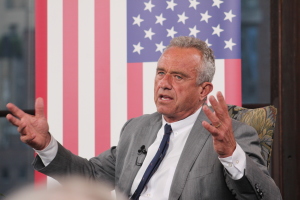'Caustic and demonizing': Jewish groups denounce PCUSA calling Israel an ‘apartheid’ state

Jewish organizations in the United States have denounced the Presbyterian Church (USA)'s recent passage of a resolution labeling Israel's treatment of Palestinians an "apartheid."
Last Friday, delegates at the PC(USA) General Assembly voted 266-116 to pass an overture that claimed that Israel was an apartheid state due to its treatment of the Palestinian territories.
Rabbi Eric J. Greenberg of the Los Angeles-based Jewish human rights organization Simon Wiesenthal Center claims that the largest Presbyterian denomination in the U.S. is bearing false witness.
"PCUSA leadership has violated G-d's commandment not to bear false witness, rendered itself irrelevant in the world of peacemaking, and made a mockery of honest dialogue and interfaith relations," Greenberg said in a statement shortly after the vote,
Jackie Subar of the Anti-Defamation League argued that the resolution "will have serious and damaging consequences to PCUSA's relations with the Jewish community."
"Choosing to utilize such a caustic and demonizing term as apartheid — or, worse, comparing Israel's actions to those of the Nazis during the Holocaust — feeds into an unhealthy discourse that, despite all the injustice in the world, positions Israel, and only Israel, as uniquely evil among the nations," wrote Subar.
"Moreover, this resolution will do nothing to constructively advance understanding and peace between the parties or promote the building of conditions that can lead to direct negotiations and ultimately a two-state solution to the Israeli-Palestinian conflict with security, self-determination, and dignity for both peoples."
Known as INT-02 and sponsored by the PC(USA) Presbytery of Grace of Irving, Texas, the overture said that "the government of Israel's laws, policies, and practices regarding the Palestinian people fulfill the international legal definition of apartheid."
"Apartheid is legally defined as inhuman acts committed for the purpose of establishing and maintaining domination by one racial group of persons over any other racial group of persons and systematically oppressing them," reads the overture.
The measure claims that Israel fulfilled the definition of apartheid via creating "two sets of laws, one for Israelis and one for Palestinians, which give preferential treatment to Israeli Jews and oppressive treatment to Palestinians," alleged human rights abuses and denying Palestinian nationalism.
"It is difficult for many Christians to publicly criticize the policies of Israel's government for fear that even legitimate criticism may be seen as anti-Israel or anti-Semitic or characterized as 'picking on Israel' among many countries in the Middle East with human rights violations," claimed the resolution's "rationale" section.
"Our call as Christians means we must sometimes get out of our comfort zone and risk controversy and criticism from people or organizations with whom we are in relationship."
Presbyterians for Middle East Peace declared in a statement that the decision "does not reflect the view of the membership of the PCUSA." The advocacy organization took issue with how the overture was debated and discussed during the General Assembly.
"A highly controlled process, created to respond to Covid, instead became a means to silence outside groups from having a voice in the process," a statement from the organization reads. "Nary a Jewish voice was heard at the GA, experts offering countering opinions were not allowed to speak, only a select few of the Louisville staff had standing."
PMEP contends that the International Engagement Committee heard from three advocates who favored the motion and none from those who opposed the resolution.
"No overture opponents were invited or allowed to speak," Presbyterians for Middle East Peace declared. "Committee members also did not receive the deep background materials they have received in the past from advocacy groups on all sides of the Israel-Palestine issues. In short, committee members began their debate after hearing one side of the issue and without adequate background preparation."
"During plenary, once again voices opposed to the overture were silenced and the committee leaders took advantage of their introductory time to mislead the commissioners," the statement reads. "After two very strong statements against the apartheid overture, debate was shut down. So again opponents of the overture were silenced. It saddens us that this action took place during a GA plagued by technical difficulties in which voices and motions were not recognized. How can the denomination move forward to support actions made under such questionable circumstances?"
In recent years, the PC(USA) has garnered controversy for entertaining overtures to divest from Israel.
In 2014, the mainline Protestant denomination voted 310-303 to divest from three multinational corporations that allegedly sell products to Israel to help promote violence against Palestinians.
PC(USA) Stated Clerk Rev. J. Herbert Nelson II garnered criticism from Jewish groups in January when he compared the Israeli policies regarding Palestinians to American slavery.
Critics of Nelson's earlier remarks included the Jewish Council for Public Affairs, which said it was "dismayed" by the Presbyterian leader's "dangerous and false" comments.
"The antisemitic nature of his statement is made even more clear by his failure to mention serious human rights abuses occurring elsewhere in the world, such as the ongoing genocides against the Uyghurs and Rohingya," JCPA claimed.
"As Jews, we reject those who callously use the tragedy of the Holocaust to make political points, so we were saddened that Rev. Dr. Nelson trivialized the suffering, torture, and murder of millions of slaves as a tawdry rhetorical device."
Nelson doubled down on his position, arguing that "no one who is informed regarding the use of military power and racial bias to control the lives of Palestinian citizens can honestly avoid the truth of this situation."
"For us in the Presbyterian Church (U.S.A.) these realities make it imperative that we, as Presbyterians, find ways to have the necessary conversation with Jews who will talk with us about the real tragedy of the Palestinian/Israeli struggle," he said at the time.




























